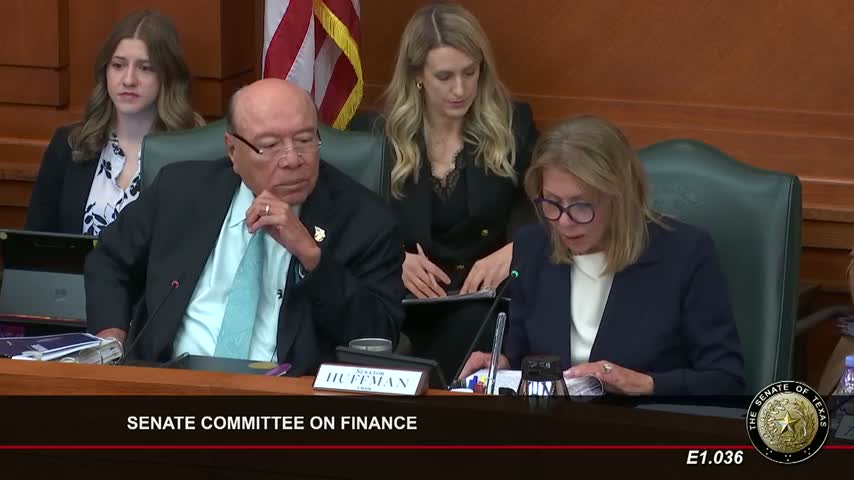Senate Finance chair unveils Senate Bill 1: $33.29 billion all‑funds base budget with $3 billion new property‑tax relief
Get AI-powered insights, summaries, and transcripts
Subscribe
Summary
Senate Bill 1, the Senate's base budget for fiscal 2026–27, was presented by Chair Jane Huffman with funding highlights including $33,290,000,000 in all funds and multiple one‑time investments and tax‑relief placeholders. The committee opened hearings on the bill with presentations to follow from the Comptroller and the Legislative Budget Board.
Senate Finance Chair Jane Huffman laid out Senate Bill 1, the committee’s base budget for fiscal years 2026–27, including an all‑funds total she described as $33,290,000,000 and a general‑revenue figure she read as “151.6 billion.” Chair Huffman said the bill centers on a mix of one‑time investments, maintenance of existing commitments and targeted tax relief items that the Senate is proposing for consideration.
Huffman told the committee the bill includes new property‑tax relief measures — including $3,000,000,000 to raise the residential homestead exemption and $3,000,000,000 in additional maintenance‑and‑operations (M&O) rate compression — and a $500,000,000 placeholder “for tax relief to businesses.” She also listed education and workforce priorities, including full funding for the Foundation School Program, a planned $4,850,000,000 increase for teacher compensation contingent on separate legislation, and new endowments to support career and technical education.
“Senate Bill 1, the Senate’s base budget for fiscal years 2026 and 2027, includes $33,290,000,000 in all funds and … 151.6 billion in general revenue,” Huffman told the committee during her opening remarks. She emphasized the budget’s mix of recurring obligations and one‑time investments and urged caution about committing short‑term revenue spikes to ongoing expenses: “I ask you to keep this in mind as we craft the next budget.”
Other highlights Chair Huffman identified in her statement to the committee include money for border operations, increases in funding for community‑based long‑term care wages, funding for wildfire aircraft, a transportation package item, and a $5,000,000,000 second tranche for the Texas Energy Fund intended to support electric reliability. She also said the bill carries an informational list of supplemental priorities that the Senate may address later in session, including a multi‑billion dollar water infrastructure contingency and a prospective one‑time payment to the employee retirement system.
The committee adopted its rules by roll call before the hearing moved into invited testimony on SB1. Committee members and agency witnesses told the committee they would follow with line‑item briefings; the chair scheduled Comptroller Glenn Hager and Legislative Budget Board staff to present the revenue estimate and the LBB’s bill overview, respectively.
Why it matters: SB1 sets the Senate’s opening policy and funding posture for the 2026–27 biennium. The broad mix of property‑tax measures, school finance funding and one‑time investments the chair listed will steer negotiations and affect supplemental requests later in session. With the comptroller’s revenue certification and the LBB’s capacity analyses expected to follow, lawmakers described the weeks ahead as a detailed and technical review period.
